With its signature beer made from surplus bread, Toast Ale is at the forefront of the fight against food waste, and the movement to make the food industry more sustainable.
Whilst visiting the Brussels Beer Project, and learning more about the ancient recipe used to brew beer from bread for their Babylone Beer, Tristram Stuart, Toast Ale’s Founder, recognized three opportunities.
Firstly, industrial quantities of bread were being wasted all over the world; secondly, the craft brewing movement was booming; and thirdly, he had spent the past 20 years catalyzing a global movement of food waste activists and entrepreneurs.
“Food production is responsible for 80% of deforestation, 70% of freshwater use, 30% of greenhouse gas emissions and is the largest contributor to soil erosion and biodiversity loss. Yet one-third of food goes to waste. We’re here to change that,” shares Co-Founder and COO Louisa Ziane, who worked as a sustainability consultant before teaming up with Stuart to create Toast Ale.
Replacing virgin barley with surplus bread
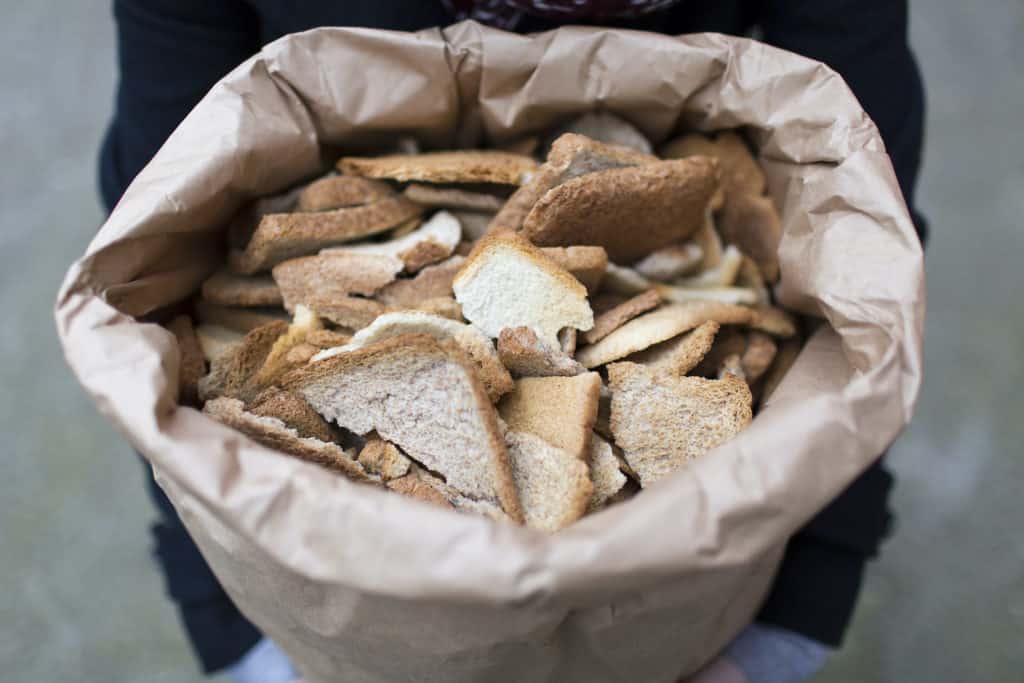
In the brewing process, Toast replaces one-third of the malted barley with bread. The bread provides starches that are broken down to fermentable sugars by enzymes contained in the malt. The yeast feeds on the sugars during fermentation to create alcohol.
Malt accounts for a significant part of the beer production carbon footprint. By replacing virgin barley with surplus bread, Toast reduces the need for land and water use in its production processes, thereby mitigating carbon emissions leading to climate change.
The social enterprise uses the heel ends of loaves that can’t be made into sandwiches. They source simple white, brown or whole-meal sliced bread that has easily accessible sugars, and is widely available.
This leftover bread would otherwise be collected by waste management companies, and processed by anaerobic digesters, where food waste is broken down into biogas for fuel and digestate for fertilizer, or used as animal feed. This is an inefficient use of the resources that go into producing food – though better than landfill.
Toast offers a core range of four beers – Lager, Pale Ale, IPA and American Pale Ale -, the recipes for each developed with different malt and hop combinations.
Zero export policy and local partnerships
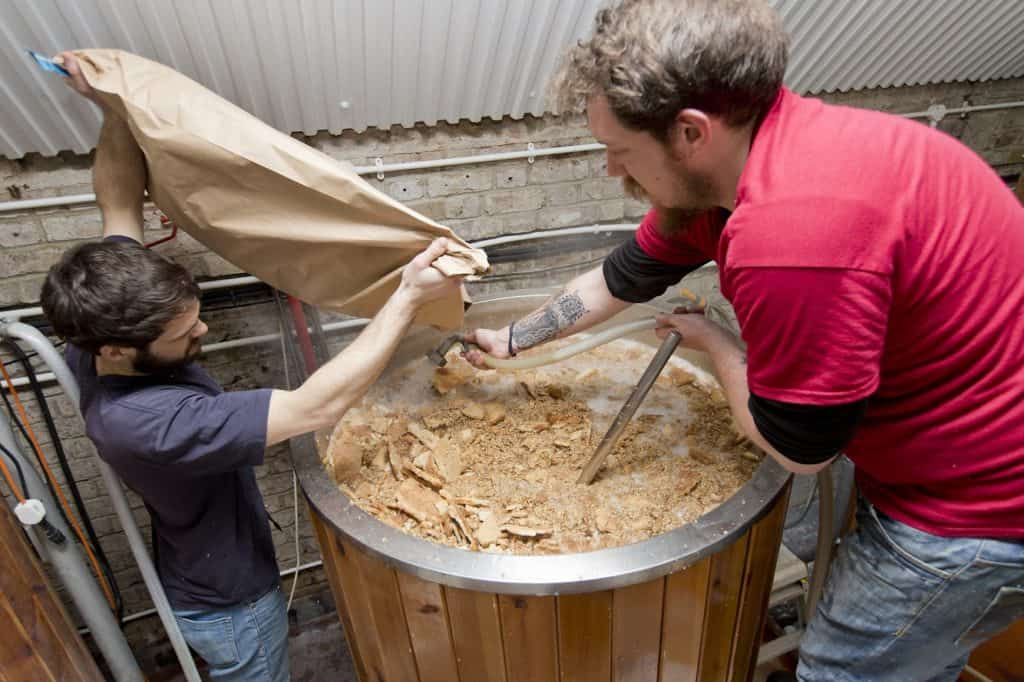
Toast open sources its recipe to home- and small-scale brewers, has a zero-export policy, and instead seeks partnerships with local breweries and charities around to world to scale its impact.
“This is a key environmental principle we will stick to. We believe in the power of local, so rather than producing beer with UK ingredients and exporting to other markets, we will always create a local production model with a local brewer and a local source of surplus bread. We share our knowledge about how to brew with bread, and agree that a proportion of the proceeds will go to a local charity.”
This business model has been successfully applied to partnerships in the US, Brazil, Ireland, Iceland and South Africa.
The Toast recipe has also attracted over 80,000 downloads since Toast’s launch in 2016 – in 2019 alone, 3,200 home brewers used the recipe, and 27 industry brewers made beer from bread.
Brewing with surplus fruits and veggies
Toast has also been experimenting with surplus ingredients other than bread through a series of collaboration beers. It has made pumpkin beer with craft brewer Brew Dog Tower Hill and the environmental charity Hubbub, and crumpet beer from the popular pancake-like breakfast item in the UK with baking firm Warburtons.
For its Toast & Marmalade beer with Windsor & Eton Brewery, the social venture sourced surplus citrus fruits and orange pulp, a production by-product, from Rejuice, which makes cold pressed juices from so-called ugly fruits and vegetables that are discarded for not meeting retailers’ cosmetic standards.
Another of its collaboration beers combined leftover bread from the bread-making competition World Bread Awards, with surplus fruits from jam and conserve brand Tiptree.
Demonstrating the role craft beer can play in empowering vulnerable communities, Toast has also partnered with The Tap Social Movement, a brewery which employs people with criminal records to help them reintegrate into society, for a beer using surplus bread from Oxford Food Bank.
Reinvesting profits into charity
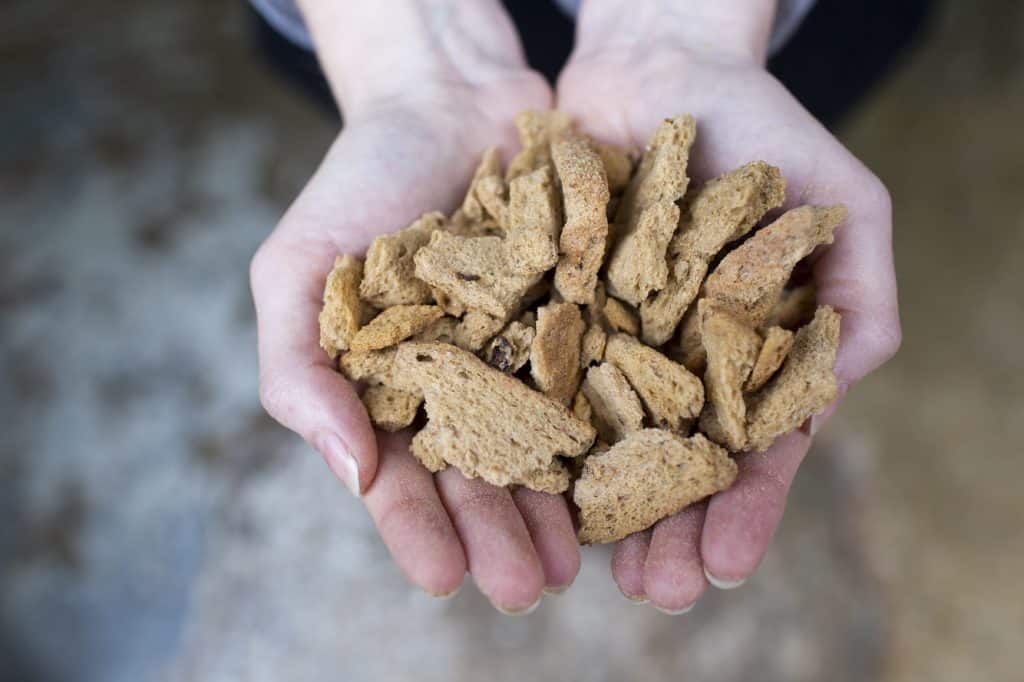
Toast quickly recognized that the systemic issues in the food system cannot be solved by one organization alone, and thus committed to reinvesting all of its profits, or a minimum of 1% of its revenue, whichever is higher, into charities working towards fixing the food industry.
This pledge is embedded in the social enterprise’s governing documents, effectively making it a legally binding commitment. Since its launch in 2016, Toast has donated over £30,000 to charity.
“Our business was funded by a unique investment model called Equity For Good. In addition to accepting no dividends, investors sign a legally binding pledge to reinvest any net capital gains in social enterprises or social impact investment funds with a positive environmental focus, or to make a gift to a not-for-profit or registered charity. This ensures all value created by Toast will continue to do good.”
Reducing carbon emissions
By the end of 2019, Toast has brewed with over 1.8 million slices of surplus bread. Stacked up, that’s 1.2 times the height of Everest.
By adopting a circular economy approach, and replacing malt with the by-product of another industry, in 2019, the social enterprise reduced water use by 108.4 m3, the same as 6.5 years worth of daily showers, and cut land use by 7.5 hectares, the equivalent of 21 people fed on a typical UK diet for a year. It has thus avoided 11 tons of carbon emissions – akin to over 1.2 million smartphone charges.
“Changing the grain bill across the entire brewing industry would free up a huge amount of land that would otherwise be converted to agriculture, reducing emissions from deforestation. It would also massively reduce emissions from cultivating, processing and transporting the grain, and from the malting process.”
Fixing the food system amidst COVID-19 (and beyond)
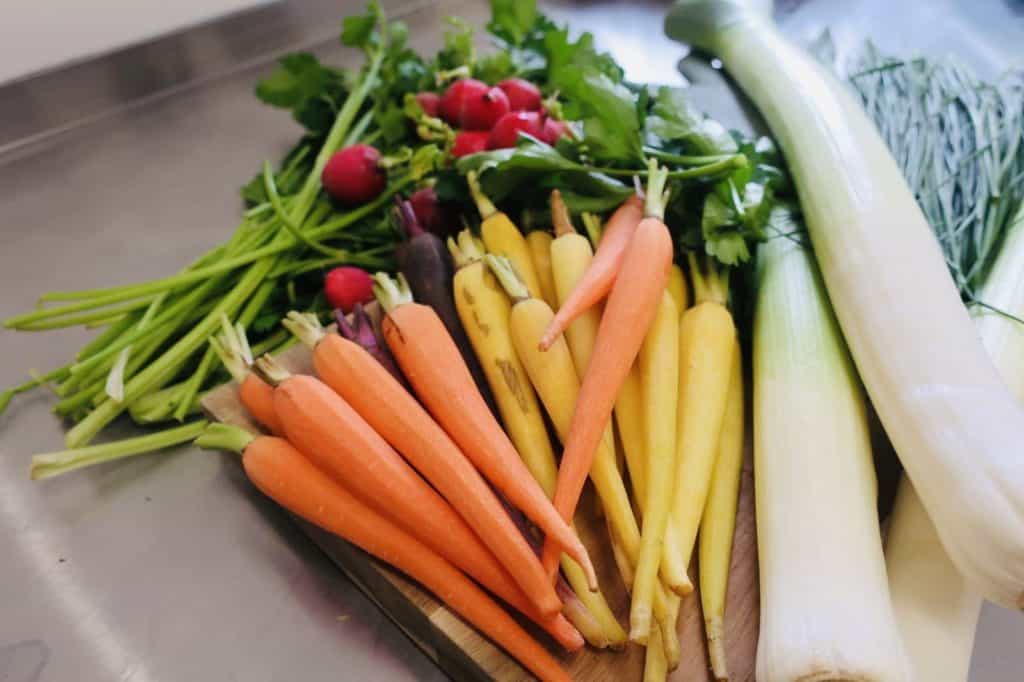
In response to the reduced number of volunteer sign-ups and food donations because of the COVID-19 pandemic, the social enterprise introduced a Meal Deal initiative with its main charity partner Feedback Global. For every beer purchased, a meal is donated to an individual in need, and Toast has so far raised enough funds to distribute over 25,000 meals to vulnerable communities.
The reinvested profits from Toast also support Feedback’s campaigns to address critical food system issues, including the use of edible crop for energy production, or conservative date labels that lead to unnecessary food waste.
The charity pioneered the ugly fruit and vegetable campaign, and the Gleaning Network that would engage volunteers to rescue leftover crops from farms that were rejected by supermarkets because of their shape, size or color, or were grown in excess to meet changing purchasing forecasts.
Zero emissions by 2030
As part of the wider B Corp community, Toast has also pledged to achieve net zero emissions by 2030. In 2020, the social venture will focus on two key initiatives to make their operations more sustainable:
Firstly, by improving their brewing process, and extracting a larger amount of fermentable sugar from the surplus bread, they aim to reduce the ingredients they use which currently make up about one-fourth of their carbon footprint.
Secondly, they committed to switching to more sustainable packaging, including recycled or recyclable FSC-certified cardboxes for their bottle cases, and printed cans to eliminate the need to use labels.
They supply beer on tap in reusable steel kegs, use tap handles made from reclaimed wood from bowling alleys, and provide recyclable keg badges.
Top tips for aspiring social entrepreneurs
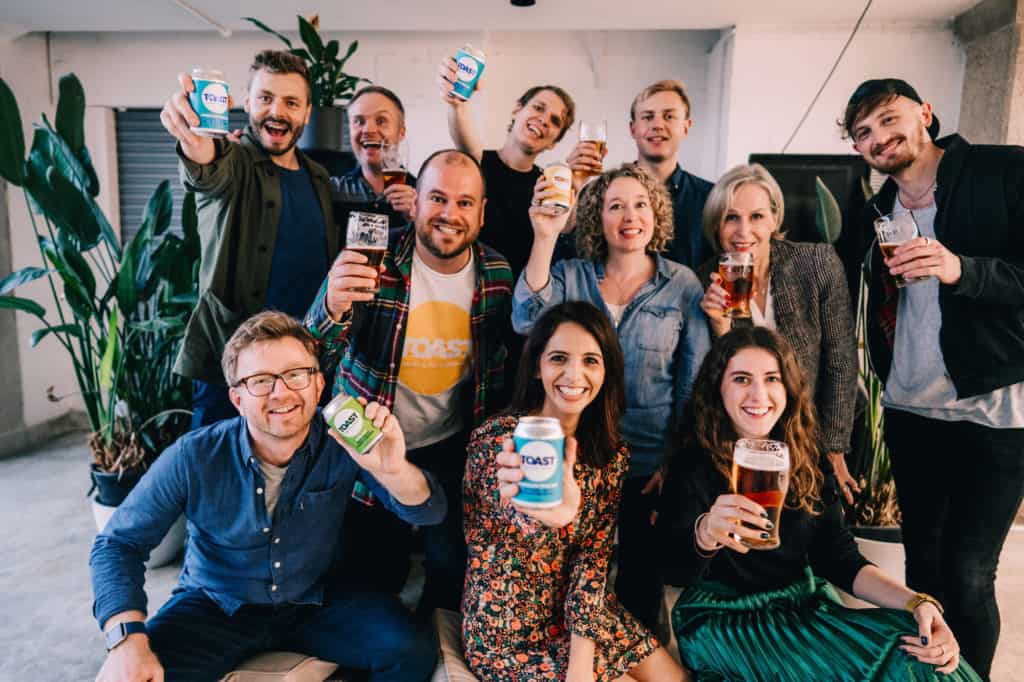
Ziane ends our interview with the customary top tips for social entrepreneurs:
- The usual rules of business apply, particularly having a great product (or service) that customers love. But social entrepreneurs need to be even more driven by their purpose, and to their unswerving commitment to people and planet, as well as profit.
- Be clear about that purpose and assess all key business decisions against it – it should filter through everything from your strategic priorities to individuals’ personal objectives. Combined with your company values, it will be your guiding light when risks present themselves (and you need to make difficult decisions), and when opportunities arise (because you can’t say yes to everything).
- Also, look after yourself. Social entrepreneurs can be particularly susceptible to burn-out due to the combined pressure to lead a commercially successful business and deliver social impact.
Full Interview
Host (Grant):
What’s up, everybody! This is Grant from Causeartist. Welcome to another episode of Disruptors for Good. Today, we’re chatting with Louisa Ziane, co-founder of Toast Ale, about creating beer from food waste and building sustainable collaborations with breweries worldwide. Food production is responsible for 80% of deforestation, 70% of freshwater use, 30% of greenhouse gas emissions, and it’s the largest contributor to soil erosion and biodiversity loss. It’s staggering to realize how food production and waste impact our environment, and yet, one-third of our food goes to waste.
Toast Ale focuses on upcycling bread into beer to tackle this issue. By replacing one-third of the malted barley in their brewing process with surplus bread, Toast is helping to reduce food waste and create a sustainable product. The process involves using the starches from bread, which are broken down into fermentable sugars, feeding yeast during fermentation to create alcohol. The bread they use includes the heel ends of loaves that can’t be made into sandwiches, and they source white, brown, and whole wheat bread from local bakeries and stores that would otherwise throw it away.
One of the coolest things they do is offer an open-source recipe for home brewers. The recipe has been downloaded over 80,000 times, allowing home brewers around the world to use surplus bread in their batches. Toast Ale has also collaborated with breweries in the U.S., Europe, and beyond to integrate sustainability into their brewing processes. In this episode, we also discuss the potential for upcycling other food waste, such as pumpkins, into beer.
If you’re a beer fan like me, this will be a fun conversation! I’m excited to learn more about their presence in the U.S. and how they plan to collaborate with more breweries here to spread the Toast Ale mission. Enjoy the conversation, and as always, stay safe and healthy!
[04:09]
Host (Grant):
Louisa, let’s start with your personal journey. How did you go from working in finance to co-founding Toast Ale? What’s the origin story behind this amazing brand?
Louisa Ziane:
I started on a pretty traditional path. I studied law at university, trained as an accountant, and worked in financial services. But I always had a passion for the environment—I grew up on the edge of a city, close to nature, and felt a deep connection to the outdoors. After a while, I realized that my career wasn’t fulfilling, so I took a year off to travel around South America. That experience made a huge mark on me, and when I returned, I decided to focus on sustainability.
I started working for The Carbon Trust, helping businesses reduce their carbon emissions. After five years in that field, I took a break when my children were born and felt the need to create something more hands-on that could make a positive impact. That’s when I met Tristram Stuart, an environmentalist and campaigner focused on food systems. He had met some brewers in Belgium who were making beer using surplus bread, and the idea stuck with him. Bread is one of the most wasted food items, so he saw an opportunity to tackle food waste by upcycling bread into a product people love—beer. That’s how Toast Ale was born.
[07:52]
Host (Grant):
The statistics on food waste are mind-blowing—especially when you think about how much food is wasted while so many people are starving. What you’re doing at Toast Ale is an innovative way to address food waste. How did the initial brewing process come about, and was the beer good from day one?
Louisa Ziane:
Yeah, the food waste stats are shocking. But yes, we were lucky from the start. Our first brew was a collaboration with Brussels Beer Project in Belgium. They shared their recipe and techniques, which helped us create a great-tasting product right from the beginning. Over time, we’ve adapted the recipe, creating four different beers, including a lager and three ales. Each brew reflects the variations in ingredients, like locally sourced barley, yeast, hops, and water, which can all influence the flavor.
We’ve also fine-tuned how we use bread in the brewing process. Bread behaves differently than barley, so there were some adjustments to make. Now we’re at a point where we’re confident in the recipe, and we’ve made it open-source for home brewers. It’s been downloaded over 80,000 times, which is incredible! We’ve also collaborated with breweries worldwide to help them incorporate surplus bread into their brewing processes.
[12:14]
Host (Grant):
Toast Ale has a unique business model. Can you explain how it works and how you’ve made it successful?
Louisa Ziane:
We’re structured as a social enterprise, which means we reinvest our profits into our mission. Specifically, 100% of our profits go to a charity called Feedback, which works to tackle systemic issues within the food system. Food waste is a symptom of inefficiency, and Feedback works to address these inefficiencies at a policy level, pushing for changes in government and corporate policies.
Even in years when we’re not profitable, we’ve committed to donating at least 1% of our revenue to Feedback. Our model allows us to focus on making a positive impact while also being financially sustainable.
[17:03]
Host (Grant):
What kind of impact has Toast Ale had so far? Are there any specific numbers or achievements that stand out to you?
Louisa Ziane:
Our primary metric is the amount of bread we’ve prevented from going to landfill. So far, we’ve saved almost 2 million slices of bread, which is about three times the height of Mount Everest if you stacked it all up! By using bread in our brewing process, we’re reducing the need for virgin barley, which has a significant carbon footprint due to the energy, water, and land used in its production. We also prevent food waste from ending up in landfills, where it would emit methane—a potent greenhouse gas.
Additionally, we track the financial donations we’ve made to Feedback and the positive impact they’ve had through their campaigns.
[19:30]
Host (Grant):
Has the homebrewing aspect of Toast Ale taken off? Have people been reaching out to share their experiences with brewing your recipe?
Louisa Ziane:
Yes, it’s been amazing! We’ve seen over 80,000 downloads of our homebrew recipe, and people regularly reach out to share their experiences or ask for advice on tweaking the recipe. It’s fantastic to see people around the world, from Singapore to the U.S., using surplus bread in their homebrews. It’s a great way to spread the message of sustainability and food waste reduction.
[22:59]
Host (Grant):
You mentioned collaborations with other breweries. Can breweries just use your open-source recipe, or do they need to partner with you?
Louisa Ziane:
We’ve made the homebrew recipe open-source, so anyone can download and use it. However, scaling it up for commercial production is more complex. The bread behaves differently in commercial brewing equipment, so we’ve worked closely with our partners to help them get the most out of the process. We’re always open to collaborating with breweries, and it’s been great to see some breweries take inspiration from us and brew their own bread beers.
[26:08]
Host (Grant):
Have you discovered any new insights or ideas for upcycling other food waste in the brewing process?
Louisa Ziane:
Yes, we’ve experimented with different types of bread and other surplus foods. For example, we did a collaboration with BrewDog using surplus pumpkins after Halloween. The pumpkins were left over from farms that grew them for jack-o-lanterns, and they weren’t going to be used for food. The resulting beer was delicious! We’ve also explored upcycling the spent grains from the brewing process, which still contain valuable nutrients. There’s a company in the U.S. called ReGrained that turns spent grains into flour for baking, which is a great example of closing the loop in the food system.
[32:52]
Host (Grant):
What does the future hold for Toast Ale? Any big sustainability goals or exciting projects coming up?
Louisa Ziane:
We have big plans! While we don’t own our own brewery—we contract brew with selected partners to keep things lean and scalable—we’d love to create a research and development site to experiment with new recipes and sustainability innovations. Our long-term goal is to get the entire brewing industry to adopt bread brewing. If all breweries used surplus bread, we could significantly reduce bread waste and have a huge environmental impact.
We’re also exploring ways to encourage more collaboration in the industry. Breweries are naturally collaborative, and it’s one of the things I love about the sector. By working together, we can make a bigger impact.
[40:17]
Host (Grant):
How’s the team doing during COVID-19? What’s the atmosphere like in the UK right now?
Louisa Ziane:
It’s been a tough time. We had to furlough half our team, so only four of us are working at the moment. Like many other businesses, we’ve shifted our focus online. The situation in the UK is mixed—there’s a lot of uncertainty, but also a strong sense of community. People are supporting each other, and we’re seeing positive changes, like more interest in local, sustainable food systems. Hopefully, we’ll come out of this stronger.
Host (Grant):
Thanks so much for your time, Louisa. I’ve been a fan of Toast Ale for a while now, and it’s inspiring to see what you’re doing to tackle food waste and promote sustainability. Best of luck with your future projects—I hope more breweries get involved in collaborations, and I can’t wait to try more of your beers!
Louisa Ziane:
Thank you! We’d love to collaborate with more breweries in the U.S. Fingers crossed, we’ll have Toast Ale available for more people to try soon!
Host (Grant):
Looking forward to it! Thanks again for the conversation. Stay safe and healthy!








